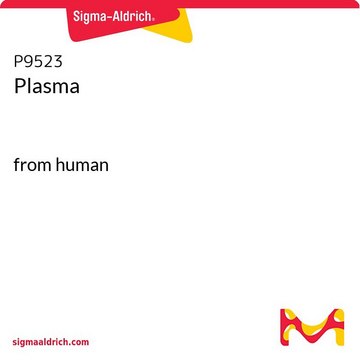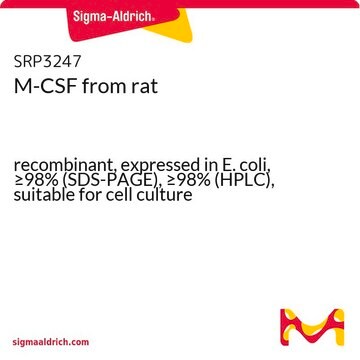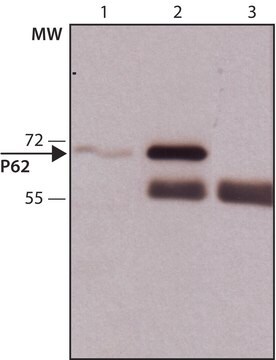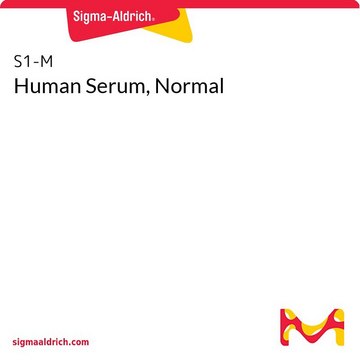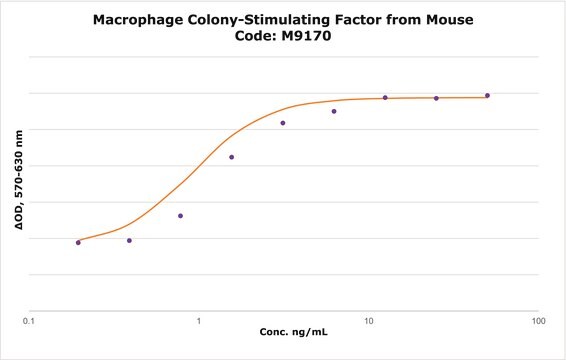SRP3332
M-CSF rat
Animal-component free, recombinant, expressed in E. coli, ≥98% (SDS-PAGE), ≥98% (HPLC)
Synonim(y):
CSF-1, MGI-IM
Zaloguj sięWyświetlanie cen organizacyjnych i kontraktowych
About This Item
Kod UNSPSC:
12352202
NACRES:
NA.32
Polecane produkty
pochodzenie biologiczne
rat
rekombinowane
expressed in E. coli
Próba
≥98% (HPLC)
≥98% (SDS-PAGE)
Postać
lyophilized
siła działania
≤5.0 ng/mL ED50
masa cząsteczkowa
36.2 kDa
opakowanie
pkg of 10 μg
zanieczyszczenia
tested
numer dostępu UniProt
Warunki transportu
wet ice
temp. przechowywania
−20°C
informacje o genach
rat ... CSF1(78965)
Opis ogólny
Macrophage colony stimulating factor (M-CSF) is a potent hematopoietic factor produced by a variety of cells including lymphocytes, monocytes, fibroblasts, endothelial cells, myoblasts and osteoblasts. The gene encoding this protein is localized on rat chromosome 2q34. The human protein is reactive in murine systems, but the murine molecule exhibits no activity on human cells. Recombinant rat M-CSF is a 36.2kDa homodimeric protein containing two 155 amino acid polypeptide subunits.
Działania biochem./fizjol.
Macrophage colony stimulating factor (M-CSF) is a key regulator of cellular proliferation, differentiation, and survival of blood monocytes, tissue macrophages and their progenitor cells. M-CSF has been shown to play important roles in modulating dermal thickness, and male and female fertility. M-CSF is clinically used in the treatment of infection, malignancies and atherosclerosis. It facilitates hematopoietic recovery after bone marrow transplantation.
Postać fizyczna
Lyophilized from 10 mM Sodium Phosphate, pH 7.5.
Rekonstytucja
Centrifuge the vial prior to opening. Reconstitute in water to a concentration of 0.1-1.0 mg/ml. Do not vortex. This solution can be stored at 2-8°C for up to 1 week. For extended storage, it is recommended to further dilute in a buffer containing a carrier protein (example 0.1% BSA) and store in working aliquots at -20°C to -80°C.
Ta strona może zawierać tekst przetłumaczony maszynowo.
Kod klasy składowania
11 - Combustible Solids
Klasa zagrożenia wodnego (WGK)
WGK 3
Temperatura zapłonu (°F)
Not applicable
Temperatura zapłonu (°C)
Not applicable
Certyfikaty analizy (CoA)
Poszukaj Certyfikaty analizy (CoA), wpisując numer partii/serii produktów. Numery serii i partii można znaleźć na etykiecie produktu po słowach „seria” lub „partia”.
Masz już ten produkt?
Dokumenty związane z niedawno zakupionymi produktami zostały zamieszczone w Bibliotece dokumentów.
Chemokines and the tissue-specific migration of lymphocytes.
Kunkel, E.J. and Butcher E.C.
Immunity, 1, 1-4 (2002)
Stanley, E.R.
The Cytokine Handbook, 387-418 (1994)
Yuying Tang et al.
Brain, behavior, and immunity, 68, 248-260 (2017-10-31)
Accumulation of microglia occurs in the dorsal horn in the rodent model of chronic post ischemic pain (CPIP), while the mechanism how microglia affects the development of persistent pain largely remains unknown. Here, using a rodent model of CPIP induced
The osteopetrotic mutation toothless (tl) is a loss-of-function frameshift mutation in the rat Csf1 gene: Evidence of a crucial role for CSF-1 in osteoclastogenesis and endochondral ossification.
Van Wesenbeeck L
Proceedings of the National Academy of Sciences of the USA, 99(22), 14303-14308 (2002)
Circulating colony stimulating factor-1 and breast cancer risk.
Tamimi RM
Cancer Research, 68(1), 18-21 (2008)
Nasz zespół naukowców ma doświadczenie we wszystkich obszarach badań, w tym w naukach przyrodniczych, materiałoznawstwie, syntezie chemicznej, chromatografii, analityce i wielu innych dziedzinach.
Skontaktuj się z zespołem ds. pomocy technicznej